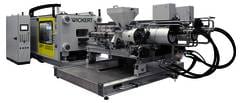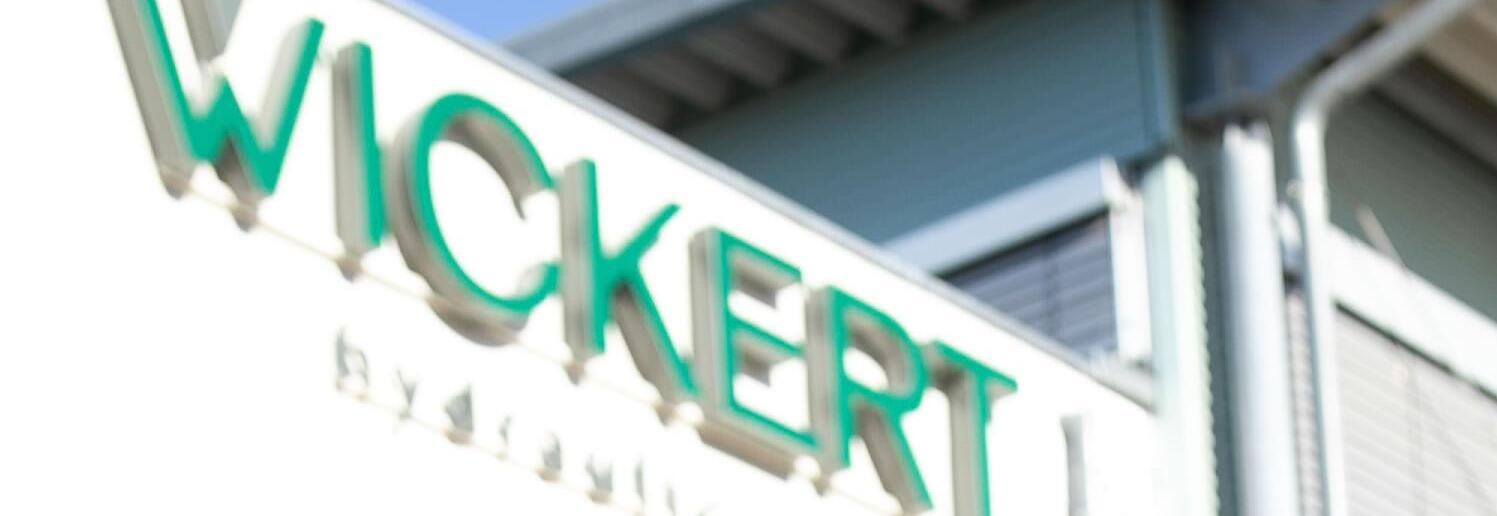
WICKERT Maschinenbau, Landau, world market leader in elastomer presses, has developed a horizontal injection molding machine for large-volume plastic moldings. In use by FRIATEC AG, Division Rheinhütte Pumpen in Rennerod, this machine processes polypropylene (PP) and polyvinylidine fluoride (PVDF) with significantly greater economic efficiency.
The WPM 10000 S injection molding machine can produce impellers, volutes, housing covers and circular parts for chemical applications. There are no standard 'off-the-peg' machines available which are capable of processing media such as very abrasive PVDF in injection volumes of more than 24 liters (24,000 cm³). To meet the challenge of enabling this, WICKERT has designed and built a horizontal injection molding machine with a locking force of 10,000 kN. The working area measures 1,200 x 1,200 mm and plate distance and stroke is 1,500 mm. The system contains a double injection unit to enable two different media to be processed. The press has two autonomous injection units, the positions of which can be adjusted by sliding. The capacity of each unit is 24 liters.
The reduced need for cleaning is not the only advantage of this design. Dipl. Ing. Achim Görres, Production Manager at Division Rheinhütte Pumpen, notes that "The double injection unit removes the need for cleaning when the media are changed. This gives us a significant cost advantage because, with some granulates costing up to € 40 / kg, there are no media losses. We also save time because the second medium can be pre-warmed, a process which can last up to 4 hours, while we are using the first medium."
The media themselves are particularly resistant to aggressive acids and substances. PP can be processed at temperatures of up 200 °C and PVDF at up to 360 °C. At these processing temperatures, aggressive acids are released by the media in the sealed machine. This shows that the injection molding process places great strains on the quality and surface properties of the injection unit. To be certain that the necessary media can be processed, WICKERT has designed the injection units to withstand 400 °C. The design also provides protection against wear for parts in contact with media in their plastic states.
The previous machine always needed to be cleaned each time the medium was changed. It had only one injection unit, and at approx. 16 l, the extruder had a lower capacity than today's 24 l capacity. Producing pump parts in low-number production runs required removal of the screw for cleaning at each change of medium - a process taking some 5 to 6 hours. A second injection unit makes the production of small batch sizes a much more economic proposition.
As regards pressure, temperature and time control and regulation, the machine uses cutting edge technology and features all the necessary quality assurance information. The system also features the standard injection molding and ejector options, connection to tempering units for tools, etc.
Achim Görres regarded production flexibility and media savings as particularly important. Providing customers with short turnaround times for their orders ranks above productivity gains. WICKERT solutions enable both. Given the many years of positive experience as regards service, availability and durability of the smaller presses in operation in the factory, it was an obvious move to contact WICKERT and ask for the type of solution which otherwise was not available on the market. Manufacturers of standard production-line models had no solution to offer. Ultimately, the decisive factor was the convincing design of the new (special) machine. Moreover, it took only 6 weeks to get from the initial idea to the basic concept, which then led to discussion of details and eventually to production. WICKERT Marketing Manager Thomas Klimpl says with pride, "The WPM 10000 S once again demonstrates our company's performance level as regards special solutions for all types of presses."
